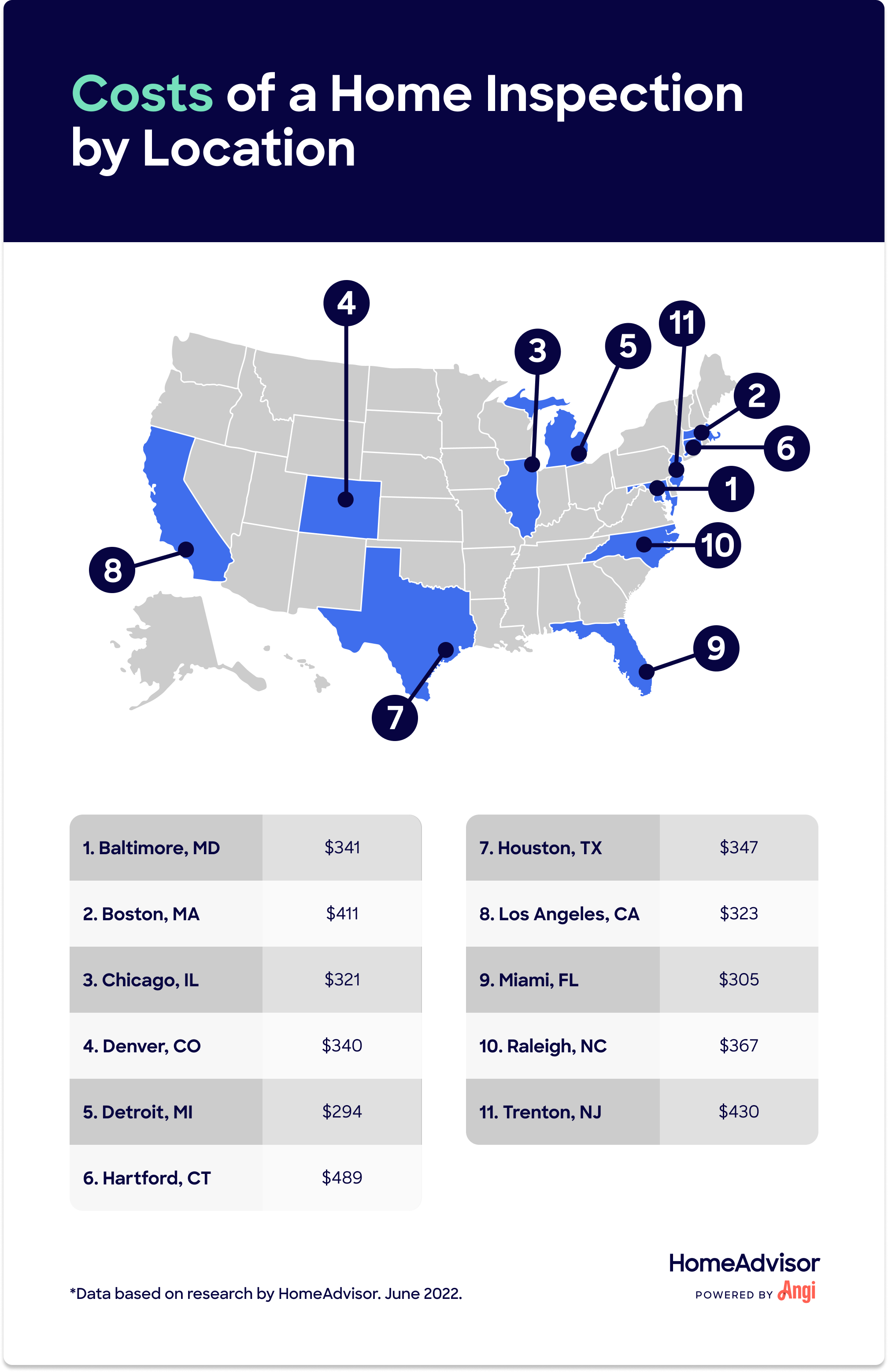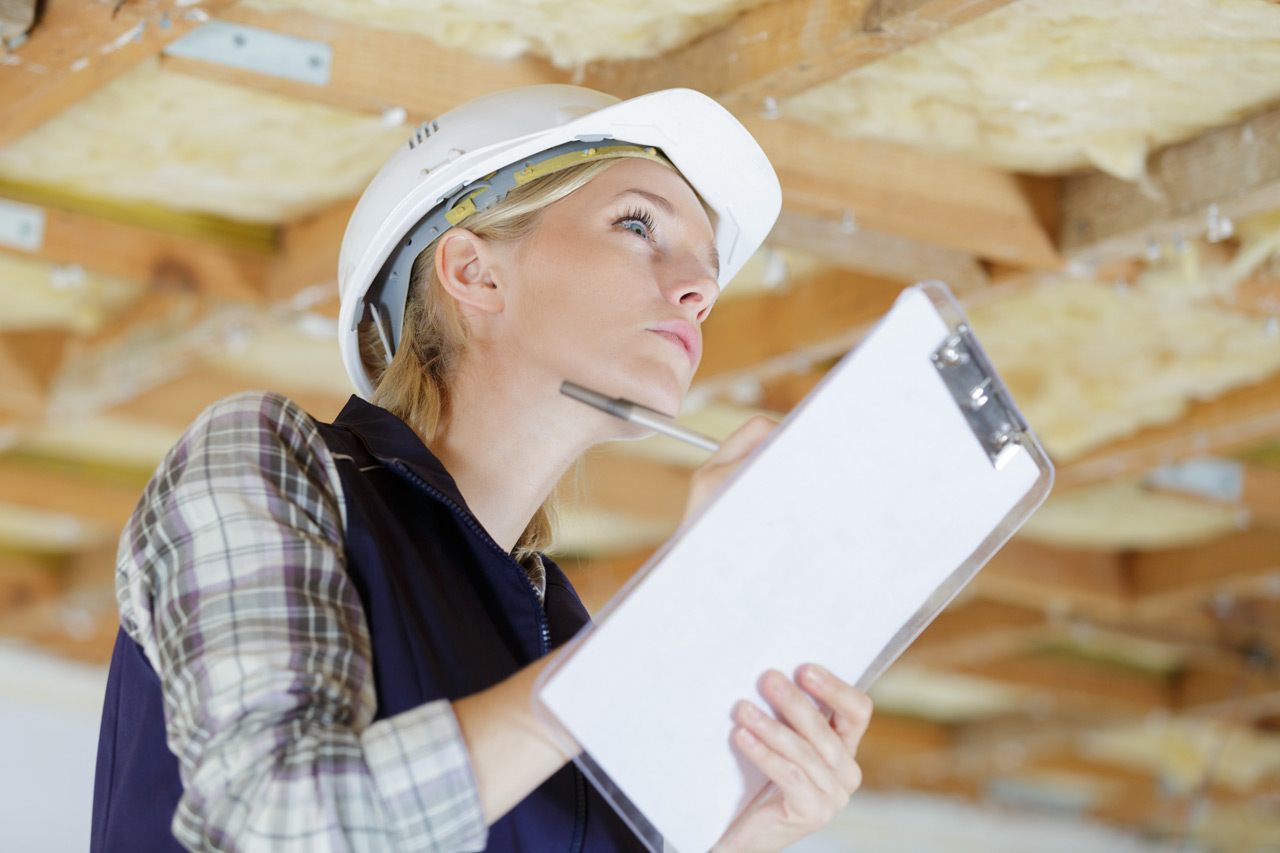How Much Does a Home Inspection Cost?
Typical Range:
$296 - $424
Typical Range:
$296 - $424
Cost data is based on actual project costs as reported by 33,938 HomeAdvisor members. Embed this data
.
.
.
.
.
.
.
.
.
.
.
.
.
.
.
.
.
.
.
.
.
.
.
.
.
.
.
.
.
.
•
•
•
•
Updated June 8, 2022
Reviewed by Robert Tschudi, Expert Home Building and Remodeling Contributor.In the U.S., a home inspection costs between $296 and $424, and you can expect to pay $343 on average for the service. However, home inspection costs vary because they depend on your location, home’s size, and the inspector’s experience level.
Let's calculate cost data for you. Where are you located?
Where are you located?
| National Average | $343 |
| Typical Range | $296 - $424 |
| Low End - High End | $188 - $510 |
Cost data is based on actual project costs as reported by 33,938 HomeAdvisor members.
Potential home buyers should invest in home inspections because they offer a layer of protection against an unsound investment. Buyers often use the home inspection report findings to negotiate the final sale price. A professional home inspection report points out and concisely explains obvious and potential issues the buyer should know about before closing day.
Many buyers insist that their purchase agreement include a home inspection contingency. The contingency allows them to walk away from the sale if the inspection uncovers more problems than they care to address, like significant foundation damage, mold infestation, or a faulty electrical system.
After interviewing two to three certified home inspectors in your area, you’ll probably notice similarities in pricing according to your home’s location and size, but you might see a price difference for their level of expertise or years of experience.
Like most real estate topics, your location is the driving factor for the price of a home inspection. The cost for a home inspection in these popular cities ranges from about $300 to $500.
Whether it's a condo or sprawling single-family home, the size of your property partially calculates your home inspection costs. Remember that your home inspector will likely include your attic and basement space into your overall square footage and adjust their pricing accordingly.
Home Inspection Cost by Square Footage
Less than 1,000 square feet: about $200
Between 1,000 and 2,000 square feet: about $315
More than 2,000 square feet: $400 or more
If you need an inspection for a mobile home, you’ll pay about $250, but the cost increases if it's a double or triple wide model.
You should talk to two or three professional home inspectors before hiring one to inspect the house. Their rates might differ depending on their experience, certifications, and if they perform specialized inspections.
Most home inspectors perform general inspections geared toward home buyers’ immediate needs, but some have specialized training to elevate inspections. In fact, general inspectors often refer other experts to inspect different components of the home.
For example, the cost of a thermal imaging home inspection is well worth the price; it can reveal moisture issues, termite nests, electrical problems, rodent infestations, heat and energy loss, ventilation problems, foundation cracks, structural concerns, and missing insulation. Thermal imaging expertise can add as much as $250 to your regular home inspection costs.
When your general home inspector finishes, they may recommend additional specialty inspections if they detect a need for a more in-depth look. Some of the most common inspections are:
Radon inspection: $155–$700
Asbestos inspection: $230–$790
Mold inspection: $300–$990
Lead-based paint inspection: $230–$420
Sewer camera inspection: $250–$1,340
Chimney inspection: $100–$5,000
Termite inspection: $50–$280
Roof inspection: $120–$320
Structural engineer inspection: $340–$720
You shouldn’t conduct a home inspection yourself. You need expert knowledge of home construction to assess the property's condition accurately. Professional home inspectors are also familiar with the most current building codes. Hiring a home inspector near you is an investment that will provide a solid overview of the home’s condition so you can address any issues before entering into a real estate transaction.
When you hire a general inspector, you can expect to find that most have similar but not identical checklists and processes for each home. For example, a professional trained by the National Association of Home Inspectors can potentially check more than 1,000 features in your home. If you’re concerned about any particular function or system, ask your inspector if it’s covered in the inspection.
At the end of the inspection, the inspector should present you with a report listing the problem areas they found and photos. Your report primarily includes information about these items:
Appliances
Plumbing
Foundation
Roof
Attic and basement
Windows and doors
HVAC system
Fireplaces
Major built-in appliances
The general interior and exterior
A thorough home inspection can reveal issues that you might otherwise not know about and provide you an opportunity to address them before selling your home. Or, if you’re the home buyer, the inspection helps you decide whether or not to continue the sale or negotiate with the seller the final sale price if the inspector finds extensive problems.
Here’s a look at common scenarios inspectors encounter and their costs to repair.
Foundation repairs: Repairing damage to the foundation costs most homeowners $2,150 to more than $7,500. The reason for this wide variance is that each foundation requires a specific type of repair based on the damage source. In severe cases, you may need to replace the foundation altogether.
Mold: The best mold inspectors and remediators discover and remove mold from any affected portions of your home. Crawlspace removal costs between $500 and $4,000 and removing it from ducts, walls, attics, and other areas can add up to $6,000. If the mold caused extensive structural damage, repair costs could increase between $10,000 and $30,000.
Basement: If you hire a professional contractor to bring your basement up to code to use as an additional room, you’ll pay between $10,000 and $35,000, depending on if you want to use it as storage space or if you want to transform into a room for everyday use.
Plumbing: You can expect to pay $275 for a licensed plumber who takes care of typical plumbing concerns like clogged sinks, slow flushing toilets, and sink fixture replacement. Tree root problems are more expensive and have a base cost of $350 with another $250 if a video examination is necessary. If you need to replace your main sewer, it costs an average of $2,450.
Electrical: Depending on where you live, improving a house’s electrical system to meet local code costs between $10,000 and $15,000.
HVAC: A new furnace costs between $2,800 and $6,760. If you need air conditioner or furnace parts, repairs often price between $500 and $700.
Windows: Replacing a window costs between $300 and $2,100. However, if the frame has rot, termite, or other pest damage, you can expect to pay between $450 and $1,000 per window.
Flooring: Repairing joists costs between $100 and $300 per joist. However, if the damage is extensive and you need replacements, a single section can cost between $5,000 and $10,000. If you need to replace all of the joists and jack up the entire house, you can expect to pay between $10,000 and $30,000 or more, depending on the size of the house and the ease of access beneath it.
A home inspection course and license costs between $1,000 and $3,500, depending on the level and area of expertise you want to pursue.
The home buyer generally pays for a home inspection to assess if the property is a safe investment. However, in some cases, a home seller will schedule a home inspection to unearth any issues that could affect the asking price.
No, most often, the home inspection isn’t part of the closing costs. A home inspection is entirely optional, but it’s a good investment because it provides a good overview of the home's condition.

